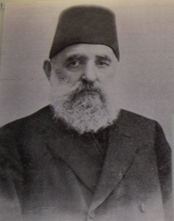محمد سعيد پاشا
| كچك محمد سعيد پاشا | |
|---|---|

| |
| الصدر الأعظم للدولة العثمانية | |
| في المنصب 18 أكتوبر 1879 – 9 يونيو 1880 | |
| العاهل | عبد الحميد الثاني |
| سبقه | أحمد عريفي پاشا |
| خلفه | قدري پاشا |
| في المنصب 12 سبتمبر 1880 – 2 مايو 1882 | |
| العاهل | عبد الحميد الثاني |
| سبقه | قدري پاشا |
| خلفه | عبد الرحمن نور الدين پاشا |
| في المنصب 12 يوليو 1882 – 30 نوفمبر 1882 | |
| العاهل | عبد الحميد الثاني |
| سبقه | عبد الرحمن نور الدين پاشا |
| خلفه | أحمد وفيق پاشا |
| في المنصب 3 ديسمبر 1882 – 24 سبتمبر 1885 | |
| العاهل | عبد الحميد الثاني |
| سبقه | أحمد وفيق پاشا |
| خلفه | كامل پاشا |
| في المنصب 9 يونيو 1895 – 3 أكتوبر 1895 | |
| العاهل | عبد الحميد الثاني |
| سبقه | أحمد جواد پاشا |
| خلفه | كامل پاشا |
| في المنصب 13 نوفمبر 1901 – 15 يناير 1903 | |
| العاهل | عبد الحميد الثاني |
| سبقه | خليل رفعت پاشا |
| خلفه | محمد فريد پاشا |
| في المنصب 22 يوليو 1908 – 6 أغسطس 1908 | |
| العاهل | عبد الحميد الثاني |
| سبقه | محمد فريد پاشا |
| خلفه | كامل پاشا |
| في المنصب 30 سبتمبر 1911 – 22 يوليو 1912 | |
| العاهل | محمد الخامس |
| سبقه | إبراهيم حقي پاشا |
| خلفه | أحمد مختار پاشا |
| تفاصيل شخصية | |
| وُلِد | 1830 أرضروم، سنجق أرضروم، إيالة أرضروم، الدولة العثمانية |
| توفي | 1914 اسطنبول، الدولة العثمانية |
| القومية | عثماني |
| الدين | Islam |
محمد سعيد پاشا (تركية عثمانية: محمد سعيد پاشا؛ Mehmed Said Pasha؛ 1830–1914), also known as Küçük Said Pasha ("Said Pasha the Younger") or Şapur Çelebi or in his youth as Mabeyn Başkatibi Said Bey, was an Ottoman statesman and editor of the Turkish newspaper Jerid-i-Havadis.[بحاجة لمصدر]
He became first secretary to Sultan عبد الحميد الثاني shortly after the Sultan's accession, and is said to have contributed to the realizations of his majesty's design of concentrating power in his own hands; later he became successively minister of the interior and then governor of Bursa, reaching the high post of grand vizier in 1879. He was grand vizier seven more times under Abdul Hamid, and once under his successor, Mehmed V Reşat. He was known for his opposition to the extension of foreign influence in Turkey.
In 1896, he took refuge at the British embassy at Istanbul, and, though then assured of his personal liberty and safety, remained practically a prisoner in his own house. He came into temporary prominence again during the revolution of 1908. On 22 July he succeeded Mehmed Ferid Pasha as grand vizier, but on the 6 August was replaced by the more liberal كامل پاشا, at the insistence of the Young Turks. Also during 1908, Mehmed Said Pasha bought the famed Istanbul arcade in the Beyoğlu district, today known as Çiçek Pasajı ("Flower Passage"). The modern name became common in the 1940s; during Mehmed Said Pasha's ownership in the 1900s and 1910s, the arcade was known as Sait Paşa Pasajı ("Said Pasha Passage").[1]
During the Italian crisis in 1911–12, he was again called to the premiership. He was again removed from power by the Savior Officers (who backed the Freedom and Accord Party (Liberal Union) against the Committee of Union and Progress) and replaced by a new cabinet supported by the Officers and the Freedom and Accord Party.[2] إلا أن جمعية الاتحاد والترقي ستعود للسلطة في العام التالي بعد انقلاب الباب العالي of 1913.
الهامش
وصلات خارجية
- Bibliography of Küçük Mehmed Said Pasha (لغة تركية)This article incorporates text from a publication now in the public domain: Chisholm, Hugh, ed. (1911). دائرة المعارف البريطانية (eleventh ed.). Cambridge University Press.
{{cite encyclopedia}}: Cite has empty unknown parameter:|coauthors=(help); Missing or empty|title=(help)[dead link]
| سبقه عريفي پاشا |
الصدر الأعظم للدولة العثمانية 1879–1880 |
تبعه محمد قدري پاشا |
| سبقه محمد قدري پاشا |
الصدر الأعظم للدولة العثمانية 1880–1882 |
تبعه عبد الرحمن نور الدين پاشا |
| سبقه عبد الرحمن نور الدين پاشا |
الصدر الأعظم للدولة العثمانية 1882 |
تبعه أحمد وفيق پاشا |
| سبقه أحمد وفيق پاشا |
الصدر الأعظم للدولة العثمانية 1882–1885 |
تبعه محمد كامل پاشا |
| سبقه أحمد جواد پاشا |
الصدر الأعظم للدولة العثمانية 1895 |
تبعه محمد كامل پاشا |
| سبقه خليل رفعت پاشا |
الصدر الأعظم للدولة العثمانية 1901–1903 |
تبعه محمد فريد پاشا |
| سبقه محمد فريد پاشا |
الصدر الأعظم للدولة العثمانية 1908 |
تبعه محمد كامل پاشا |
| سبقه إبراهيم حقي پاشا |
الصدر الأعظم للدولة العثمانية 1911–1912 |
تبعه أحمد مختار پاشا |
| هذا Ottoman biographical article هو بذرة. بإمكانك مساعدة المعرفة بأن تنمـِّـيـه. |
- Articles containing التركية العثماثية (1500-1928)-language text
- Articles with unsourced statements from July 2014
- CS1 errors: missing title
- مقالات المعرفة المحتوية على معلومات من دائرة المعارف البريطانية طبعة 1911
- Wikipedia articles incorporating text from the 1911 Encyclopædia Britannica
- Articles with dead external links from October 2015
- پاشوات
- مواليد 1830
- وفيات 1914
- الصدور العظام للدولة العثمانية في القرن 19
- الصدور العظام للدولة العثمانية في القرن العشرين
- عثمانيو الحرب الإيطالية التركية
- أشخاص من أنقرة
- أشخاص من أرضروم
- All stub articles
- People of the Ottoman Empire stubs